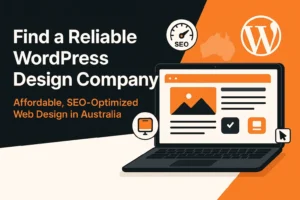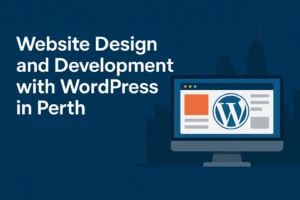Sydney is Australia’s largest and most competitive market, making it a crucial space for local businesses seeking to establish an online presence. With more companies turning to WordPress for its ease of use, flexibility, and scalability, optimising your site to appear in Sydney’s competitive search landscape is crucial.
In this guide, we’ll dive deep into the best WordPress SEO strategies for Sydney businesses, focusing on the latest SEO trends like content optimization, keyword clustering, schema/semantic SEO, and the creation of a topical map for your website.
What is WordPress SEO?
Before we jump into strategies, let’s clarify what WordPress SEO is. SEO (Search Engine Optimisation) refers to practices aimed at increasing the visibility of a website in search engine results, driving organic traffic. WordPress SEO involves techniques tailored for WordPress websites to rank better on search engines, including on-page SEO (like optimising meta tags, headings, and content) and off-page SEO (such as backlinks and social signals).
Why is WordPress SEO Essential for Sydney Local Businesses?
Sydney is a hub of activity for both large and small businesses. With so much competition, it’s not enough to simply have a website—you need a strategy to stand out. Effective SEO for local businesses helps ensure your website is visible to potential customers in Sydney who are actively searching for products and services in your industry.
For local businesses in Sydney, focusing on local SEO is crucial for appearing in search results when your customers are looking for services in their area. With WordPress SEO, you can easily optimise your site and rank higher for Sydney-based searches.
Now, let’s dive into the latest WordPress SEO trends that will give your Sydney business the edge over your competition.
1. Local SEO: The Foundation for Sydney Businesses
For Sydney businesses, local SEO is key. It helps increase your visibility in local search results and makes it easier for potential customers in your region to find you.
Local SEO Tips for Sydney Businesses:
- Claim Your Google My Business Profile: Ensure your Google My Business (GMB) profile is optimised with accurate business information like name, address, phone number, business hours, and relevant categories.
- Target Local Keywords: Incorporate location-specific keywords like “WordPress SEO Sydney” or “SEO for businesses in Sydney” into your content and metadata. These keywords are essential for ranking in local search results.
- Local Citations and Directories: Make sure your business is listed on local directories like Yellow Pages, TrueLocal, and Yelp. Consistency in your NAP (name, address, phone) across all platforms is important for SEO.
- Mobile Optimisation: With the majority of local searches happening on mobile, ensure your WordPress site is mobile-friendly. Fast loading times and responsive design are crucial for user experience and SEO.
2. Content Optimization and Keyword Clustering
Content optimization and keyword clustering are among the most powerful SEO techniques today. Content optimization is the process of making sure your website’s content meets the needs of both your users and search engines. Keyword clustering, on the other hand, involves grouping related keywords together to target them strategically, improving topical relevance and SEO results.
How to Optimise Your Content and Cluster Keywords:
- Use Long-Tail Keywords: Targeting long-tail keywords like “WordPress SEO for local businesses Sydney” or “affordable WordPress SEO Sydney services” can help you capture highly relevant traffic.
- Create Content Clusters: Group your content into clusters based on related topics. For example, if your primary focus is “WordPress SEO Sydney”, you can create additional subtopics around it like:
- “How to improve your WordPress SEO for Sydney businesses”
- “Local SEO for WordPress websites in Sydney”
- “WordPress SEO tips for Sydney-based small businesses”
This approach allows you to rank for several related terms and improves the overall topic authority of your website.
- LSI (Latent Semantic Indexing) Keywords: Use LSI keywords (related keywords) naturally in your content to give context to search engines. For example, along with “WordPress SEO Sydney”, use phrases like “local search optimization”, “WordPress website optimization”, “SEO for Sydney businesses”.
3. Semantic SEO and Schema Markup
With the rise of semantic search, it’s more important than ever to ensure that your content is not only keyword-optimized but also contextually relevant. Semantic SEO is the process of optimizing for the meanings behind the words users are searching for, not just the exact keywords.
Implementing Schema Markup for Semantic SEO:
- Schema Markup helps search engines understand your content’s context. Using structured data allows you to display rich results (like reviews, ratings, or FAQs) directly in the search engine results page (SERP).
- LocalBusiness Schema: Add schema for LocalBusiness to highlight your business’s location, hours of operation, contact information, and customer reviews.
- FAQ Schema: If you have a FAQ section, you can add schema markup to get those FAQs displayed directly in search results, improving click-through rates (CTR).
By implementing semantic SEO, your website will be better understood by search engines, improving your ability to rank for topic-related searches in Sydney.
4. Creating a Topical Map for Your Website
A topical map is a strategic way of structuring your website’s content. It helps you create an organised, hierarchical structure that search engines can easily crawl and understand.
How to Build a Topical Map for Your WordPress Site:
- Define Your Main Topics: For your WordPress SEO website, start by defining your core topic, such as “WordPress SEO Sydney”, and then branch out into related topics like “Local SEO for Sydney businesses”, “SEO plugins for WordPress”, or “Best practices for WordPress SEO”.
- Use Internal Linking: Link relevant pages within your website to establish strong topical relevance. For example, link your blog posts to service pages, or have internal links between related content clusters.
- Content Gaps: Use tools like Google Search Console, Ahrefs, or SEMrush to identify content gaps. This allows you to expand your topical map and cover all aspects of WordPress SEO for Sydney businesses.
5. WordPress SEO Best Practices for Sydney Businesses
Essential WordPress SEO Tips:
- Optimise Meta Tags: Title tags and meta descriptions are still crucial for SEO. Include “WordPress SEO Sydney” and other local keywords in your title tags and meta descriptions to increase relevance.
- Mobile Optimisation: Sydney customers are likely searching for services on their smartphones. Ensure your WordPress website is fully mobile-responsive for a seamless experience.
- Backlinks: High-quality backlinks remain one of the most powerful ranking factors. Focus on getting backlinks from local Sydney blogs, industry directories, and trusted websites to improve your authority.
- Page Speed Optimisation: Use caching plugins like WP Rocket or W3 Total Cache to improve your page load speed. Search engines like Google prioritise fast-loading websites in their rankings.
Conclusion
Implementing the right WordPress SEO strategies is essential for Sydney businesses aiming to rank higher in local search results. By focusing on local SEO, content optimization, keyword clustering, semantic SEO, and building a topical map, you’ll improve your chances of standing out in a competitive market.
Incorporating the latest WordPress SEO best practices will help you attract more local traffic, increase customer engagement, and ultimately drive sales. Always stay updated with the latest SEO trends, and don’t be afraid to refine your strategies as Google’s algorithms evolve.
If you’re ready to take your Sydney-based business to the next level with professional WordPress SEO, we’re here to help! Contact us today to get a free website audit and see how we can improve your site’s performance. Let’s work together to boost your online presence and drive more traffic to your business.







